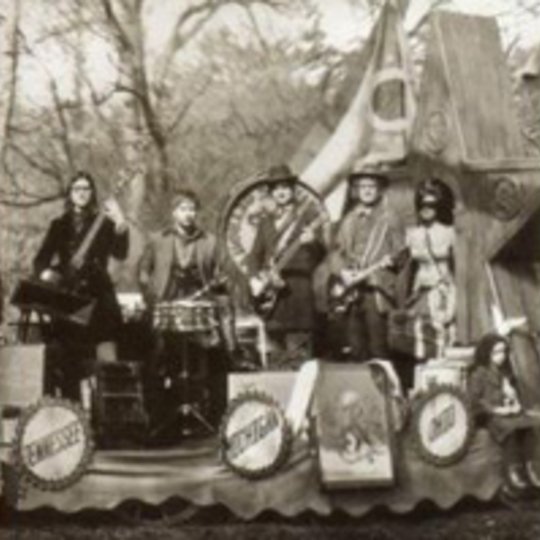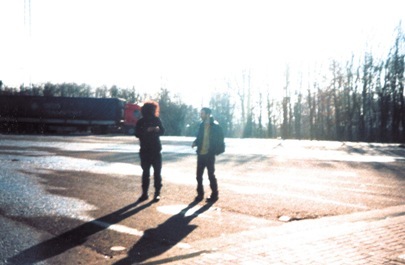It’s been obvious for a while now that Jack White’s sole motivation for making music is to escape through some rock 'n' roll wormhole back to an indeterminate point in the past when people in America dressed like it was 1939, played like the ‘60s were dying and guitar heroes were respected and given licence to deal with music hacks in the way that John Wayne might’ve. So, when White sprung unannounced with Consolers of the Lonely last month it was as if he'd hauled reviewers by the lapels over a waffle house table on the edge of some dusty hole in the Southern States, before leaving us gasping in a puff of second hand cigarillo smoke. One look at the album cover, **Raconteurs all decked out in the pomp and paraphernalia of an old-time travelling revue, is enough for the newcomer - without years spent with his arcane, ancient onstage proclamations about the blues and the death of Buddy Holly - to know that White sees himself as an old-fashioned type of man. Which makes it strange, then, that the new Raconteurs album, of which White is the clear overlord, makes such a bald concession to what the spods have long decided to be ‘the digital age’.
Just to reiterate, the White Stripe, once dressed in De Stijl’s minimal cladding, rides roughshod over this often obscenely greedy gorge on US rock’s 100 or so years of history and tradition. Brendan Benson’s guitars and vocals may be there, somewhere – my bets are placed with the three-chord bop of ‘Hold Up’ and ‘Many Shades of Black’ – and the rhythm is section is tight as_ but they never take the lead and Benson, particularly, is left behind as White flits from track to track, track _within bursting track, from back-breaking riff to absurd, whinnying solo like a berserk Eric Clapton (the title track, ‘The Switch and the Spur’), cramming three songs into places where only one should be (‘Salute Your Solution’, ‘Five on the Five’). It seems, when taken with the abrupt manner of the record’s release, to be a ploy to wrest attention from brains addled by instant now, everywhere – if people are too busy to bother with the mystique White craves and has long cultivated around himself and wife/sister in his other band, then he’ll arrive to the party late and leave early, spinning out established press loops and ad trawls (other than a video and live shows, there are doesn’t seem to be much in the way of promo activity planned). I’m not ascribing any wider significance to the record, this battle with the media and its way of skittering attention spans just seems to be a personal obsession of White’s. But, while it draws more on the southern-fried rock of Creedence Clearwater Revival and Lynyrd Skynyrd, it’s tempting to see this as, essentially, prog for the aforementioned ‘digital age’ – for people that can’t wait for a song to unfold over 20 minutes so need just as much to happen within three. As far as modern companion records go, J Dilla’s _Donuts isn’t too far off, albeit a far better and leaner album, despite its 31 tracks.
“Light bulbs are getting dim, my interest is starting to wane. I'm told it's everything a man could want and I shouldn't complain” - _‘Consolers of the Lonely’
Withdrawing from spurious wider notions on the significance of Consolers of the Lonely, the personal progression of its main protagonist is easier to tackle. First off, it’s only right and proper to realise that chastising Jack White for being unoriginal would be ridiculous. While his music is and probably always will be rooted in the raked-over standards of American blues – not for White the European or African textures so fashionable among today’s avant-garde – the world’s only real guitar hero was always to be found, in his better moments, channelling that past something electric; strained and possessed, like a human lightning rod. The epitome of this, to my mind, came during a live rip through ‘_Screwdriver’ at a rainy and windswept Reading Festival in 2002 that will live long in the memory.
Here, things are more relaxed, probably because that’s exactly what White can now afford to be – he has money, fame, adoration, friends, a wife and kids. The obvious progression from the down, success-less years – soundtracked by Robert Johnson, Bo Diddly, the mad howl of Robert Plant that got White starry-eyed – to those in which Jack finds himself, now, succeeding, is manifested in the way Consolers of the Lonely slips easily into the retiring guise of whiskey’ed, porch-guarding “Confederate_” rock. The old cliché about the blues singer needing heartache and despair to function has by now, after hundreds of years of history, built up enough weight to move beyond a truism: the truth is White was worth so much more when he sounded like a lonely, tortured blues howler, moving from barroom to bedroom with only the dumb drumming of his ex-wife for conversation.
Tired truism becomes truth, too, as White succumbs to that classic rock star jinx – in getting everything he ever wanted, he lost everything that made him great. So, where everything up to White Blood Cells – some of Elephant, even – was shaded by a lonesome, yearning minimalism Consolers of the Lonely is often grotesquely overblown despite moments of genuine excitement – the title track’s strident romp home, the chorus of the record’s most lyrically revealing track ‘Rich Kid Blues_’. But they’re lost in the bluster and the weight of all the pointless noise that was never given a chance to exist in the weeded-out world of the old White Stripes.
With retrospect, Jack White was always good and potentially great enough to get here, in the rockist comfort zone alluded to in weird things like Q and Virgin Radio. It's just a shame he got here so quickly, I suppose, because it seems unlikely he'll ever be able to go back to being lonely and really, viscerally alive.
-
5's Score






















